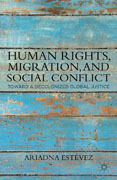
Human rights, migration, and social conflict: toward a decolonized global justice
Estévez, Ariadna
Social conflict involving migrants, which includes terrorism, migrant trafficking and kidnappings, riots and the occupation of public places, is a direct result of the systematic refusal of receiving countries to recognize that migrants have universal human rights. Analysis of this causal relationship indicates that certain elements of migration policy in Europe and North America—suchas the securitization of border controls and development cooperation policies, the widespread use of foreigners internment camps as part of a tougher asylum policy, the criminalization of irregular migration, and social exclusion resulting from widespread discrimination—lead to violent social conflict. Theseviolent conflicts of potentially global impact could be prevented were countries that receive migrants to adopt a system of justice—a decolonized global justice—that recognizes the human rights of migrants. INDICE: Human Rights and Conflict in Modern Migration: A Structural Relationship.Human Rights in the Securitization of Cooperation for Development and of Borders, and the Toughening of Asylum Policy.Human Rights in the Criminalization of Migration and the Marginalization Resulting From Social Discrimination.Conflict and Human Rights: the Consequences of Denying Human Rights.Against Citizenship: Intertextuality and the Human Rights to Mobility.Decolonized Global Justice and the Rights to Mobility: Taking the Human Rights of Migrants Seriously.Conclusion: Is Decolonized Global Justice Viable for Preventing Conflicts Related to the Denial of Human Rights to Immigrants?.
- ISBN: 978-0-230-33944-6
- Editorial: Palgrave Macmillan
- Encuadernacion: Cartoné
- Páginas: 236
- Fecha Publicación: 19/06/2012
- Nº Volúmenes: 1
- Idioma: Desconocido
